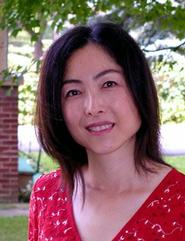
Associate Professor of Japanese Kyoko Omori gave an invited talk, “The Benshi as a Modernist: Tokugawa Musei and Psychological Films of the Early Twentieth Century,” at SUNY Binghamton on Oct. 30. Omori focused on the golden age of benshi, or silent film live narrators, who performed during the 1920s, an era that also saw the rise of modernist movements in Japanese art and literature.
Benshi performers engaged in the development of an expressly trans- or intermediatic cultural production that combined elements of traditional oral performance with the expressly “modern” medium of silent film. In particular, Omori addressed Musei’s distinctive narration for the German expressionist film, The Cabinet of Dr. Caligari.
Benshi performers engaged in the development of an expressly trans- or intermediatic cultural production that combined elements of traditional oral performance with the expressly “modern” medium of silent film. In particular, Omori addressed Musei’s distinctive narration for the German expressionist film, The Cabinet of Dr. Caligari.
Posted November 3, 2009
